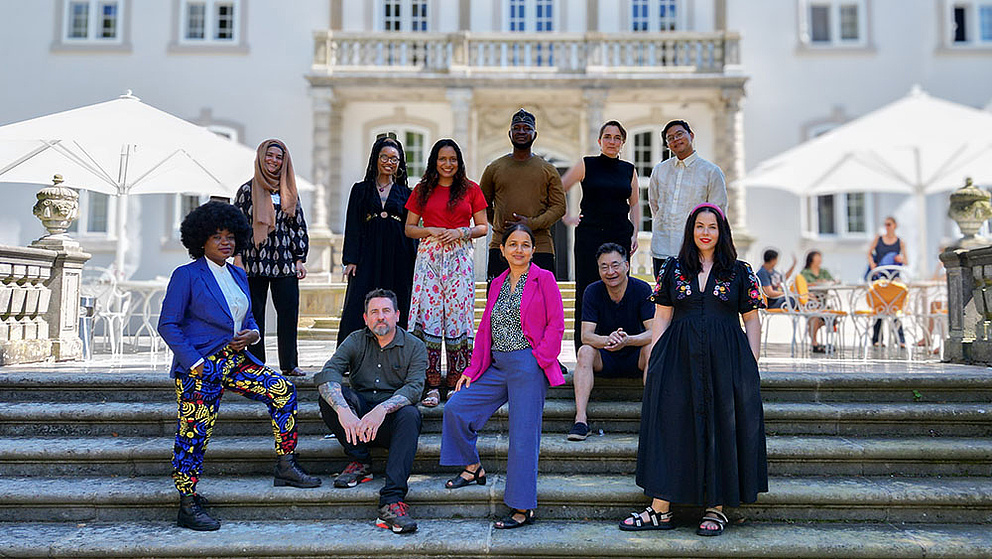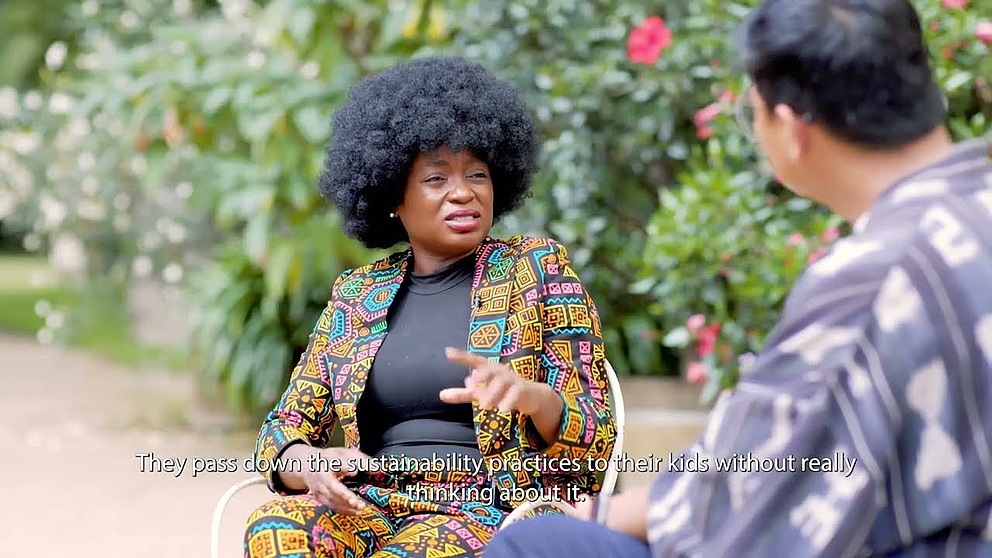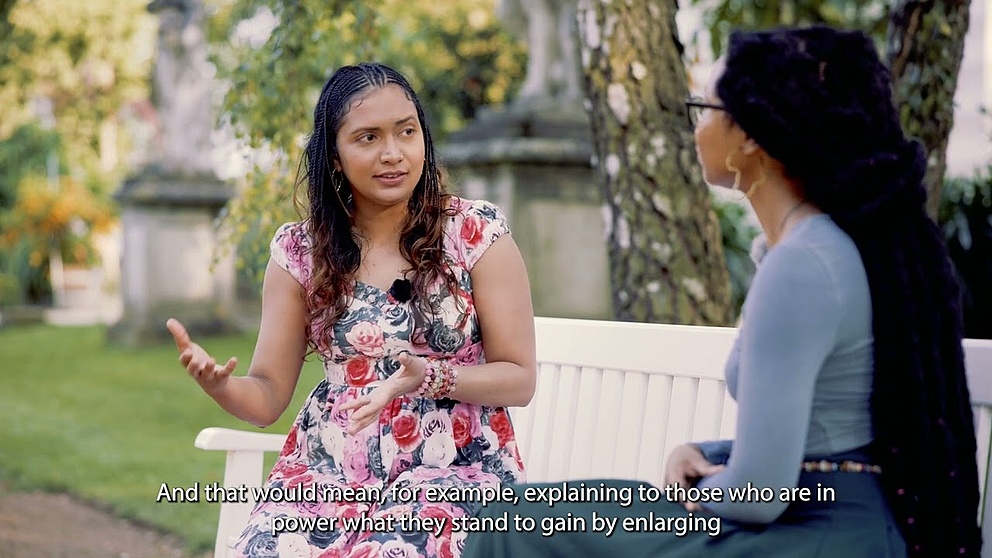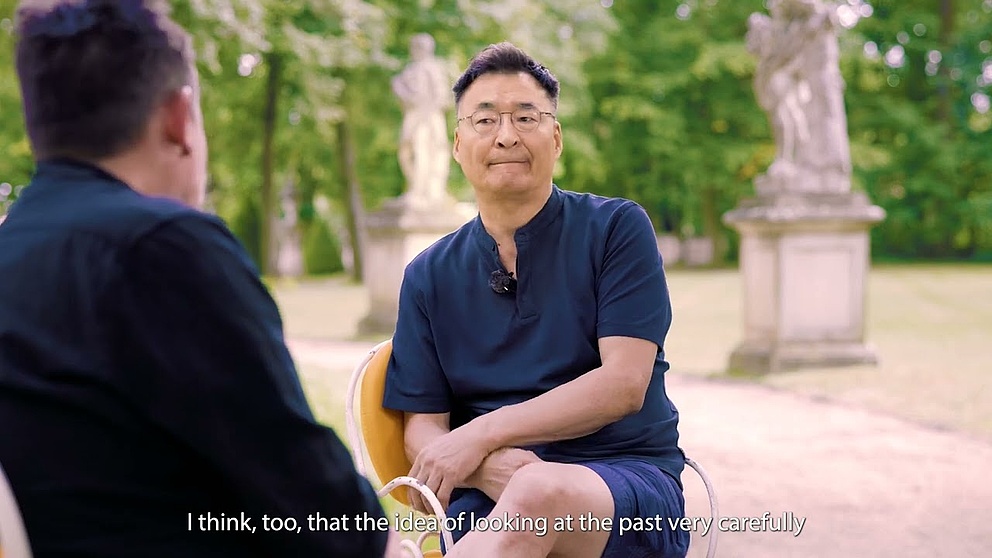Jump to the content
- {{#headlines}}
- {{title}} {{/headlines}}
Diary entry I / 12 August 2024
Harnessing local knowledge for climate resilience
How can we live a sustainable life in harmony with nature? The participants in the 2024 Humboldt Residency Programme, Adenike Adebukola Akinsemolu and Christer de Silva, find the answers in indigenous communities.
“Sustainability is a normal way of life in Nigeria’s coastal regions,” says the researcher, Adenike Adebukola Akinsemolu. “Local women are the custodians of traditional knowledge. They collect rainwater, preserve the mangroves and can predict the weather by observing the ocean.” Up to now, she continues, people have not been sufficiently aware of how valuable their expertise is, and that this knowledge could possibly be utilised in other places, too.
However, this traditional knowledge is under threat. Oil companies are destroying nature, channeling contaminated water into the sea and rivers. “People get neurological diseases and cancer. At the same time, they lose their interest in their own culture and model themselves on the western world.” Consequently, many people were turning to disposable products, casting off their traditions. And language plays a key part, as Adenike stresses. “Language is one of the most important ways of passing on traditions.” But since people are no longer learning the local language, the traditional practices are also lost.
The field of tension between local expertise in biodiversity conservation and scientific knowledge is the subject of Christer de Silva’s doctoral thesis. The science communicator campaigns for encounters on an even playing field. “I explore how different actors in research, the political arena and local communities can engage in a constructive conversation with one another.”
For a long time, environmental protection was conducted by people who did not live in the protected areas and built natural parks from the idea of ‘wilderness’ as untouched lands outside human presence. As a result, many indigenous peoples and local communities were forced to relocate in order to create conservation areas. This broke up communities; knowledge and cultural diversity were lost. “The more we work together with the local communities, the more we understand that biodiversity can also be defined differently. Indigenous peoples and local communities’ knowledge systems, beliefs, and practices help to conserve nature. In environmental protection and sustainability science we try to better understand these values and behaviors.”
About the researchers
The transdisciplinary researcher Adenike Adebukola Akinsemolu helps people in Nigeria’s coastal regions to secure their social and economic futures. Amongst other things, she documents local expertise in sustainability and climate resilience. In addition to her field work, the green microbiologist teaches tomorrow’s sustainability leaders at the Green Institute in Ondo, Nigeria.
Christer de Silva is a Filipino researcher, designer, and science communicator. In his doctoral thesis at the Australian National University, he uses transdisciplinary methods to investigate diverse worldviews and communication practices of actors in biodiversity conservation. . Specifically, he explores the tension between established science and Indigenous knowledge with a view to ways of conserving biodiversity.

Diary entry II / 26 August 2024
A voice for everyone
To live in safety and dignity, to access knowledge, to engage: these are rights that are still withheld from many people to this day. Two participants in the Humboldt Residency Programme from Mauritius and Botswana are fighting to make sure this changes. Tanya Lallmon campaigns for LGBTQIA+ rights in the former British colonies and Tlamelo Makati is searching for ways of making the internet more inclusive.
In colonial times, European occupying powers suppressed local cultures. As a result, it was not only knowledge that was lost, but colonial thinking patterns became inscribed in local legislatures. This had far-reaching consequences, amongst others, for LGBTQIA+ (lesbian, gay, bisexual, transgender, intersex, queer/questioning, asexual) minorities. “Many discriminatory laws on the African continent stem from colonial times,” explains the activist Tanya Lallmon. “The original local traditions, on the other hand, accepted these people and allowed them equal rights.”
In today’s Commonwealth, LGBTQIA+ often have to fear for their lives due to the legal situation. “In Uganda, for example, it is currently extremely dangerous to belong to the LGBTQIA+ community, and in Ghana, the elections are now being fought with anti-LGBTQIA+ slogans,” explains Tanya Lallmon. Through political campaigns and practical assistance, the activist and her supporters advocate on behalf of the members of minorities, call for de-criminalisation, a life in dignity, equal rights. In Mauritius, one of the most liberal countries on the African continent, their lobbying recently enjoyed a major success. “In 2023, the Supreme Court de-criminalised same-sex relationships – a groundbreaking judgement. Now, we are hoping that the judgement will be anchored in law.”
In her field, too, the computer scientist Tlamelo Makati also experiences that many people have to worry about inclusion. Up to now, systems were regularly tailored to people who are not disabled, she notes, come from the western world and understand English. “I spoke to blind people, for instance, about a purportedly barrier-free website. For them, this website was unusable.” The researcher is using a co-creative process to try and develop solutions that will benefit people with disabilities.
Makati is also striving to include diverse perspectives in AI development. At the moment, she says, only a few people decide on the type of data to be used to train AI models – usually White men from the western world who don’t have disabilities. The consequence is that content is distorted and it is inaccessible for a lot of people. “Most people in the world are Black, more than half are women and a large percentage acquire a disability in the course of their lives. Inclusion is not just about minorities – it’s about everyone.”
About the researchers
The advocate Nandini Tanya Lallmon lobbies for legal reform in former British colonies where discriminatory laws against LGBTQI+ people are often a remnant of colonial rule. As part of her research at the University of Malta, she is developing methodologies to bridge the gap between policy and practice pertaining to LGBTQIA+ rights in African Small Island Developing States.
Tlamelo Makati conducts research at TU Dublin on the ways artificial intelligence can be optimised to meet the needs of different groups in society. The researcher advocates the development of user-centred information systems and is committed to incorporating more diverse forms of knowledge into AI development.
Diary entry III / 2. September 2024
History as a way to process imperial injustice
Settling in foreign territory, setting up plantations, building trading empires – time and again, peoples and states have tried to expand their spheres of influence. Often by force and frequently to the detriment of the target regions. How imperial aspirations have been justified ideologically and how history can help our understanding will be addressed by two of the participants in the Humboldt Residency Programme, Matthew Fitzpatrick and Lkhamsuren Munkh-Erdene.
When people want to legitimise their own supremacy, they often become very creative: wars of aggression may be justified as the will of God, exploitation as the cost of freedom and colonialism as the supposed biological superiority of White people. Ideas like this survive in historical documents for centuries – and, in some cases, are reproduced even today. Historical research is one of the ways in which they are put to the test.
Lkhamsuren Munkh-Erdene warns against analysing sources on the basis of ideological assumptions. He cites the theory of evolutionary materialism as an example: according to this, human existence is primarily based on economic needs. It assumes that those who command the most economic resources control the state, which makes the establishment of a capitalist system inevitable. To this day, the researcher finds evidence of this theory regularly being reproduced, for instance in historical treatises on the Qing Empire. “But the Qing Empire was not actually about economic dominance at all, it was about military dominance – and the process of conquest was not instigated by the Chinese, but by the Manchus and Mongols.”
“If you look at the history of mankind, economic considerations don’t seem to have been the foundation for conquest until the 17th or 18th centuries. Despite this, many historians still reproduce the narrative that it’s different.” In the last resort, evolutionary materialism and other theories thus behaved like the “undead”: they had long since been refuted, but still shape our thinking. If you want to decolonise historical knowledge, it is therefore necessary to “de-materialise” and “de-capitalise” it.
In Matthew Fitzpatrick’s opinion, since the 17th century, it has increasingly been liberal ideas that have driven imperialist advances and are accordingly recorded in historical treatises. “In this context, liberalism is understood as the economic freedom of Europeans, not the freedom of colonialised people. This encouraged merchants to go out into the world, to pursue trade, to settle and thereby to colonise and exploit people in the Global South.” All in all, however, empires were structured very differently and justified ideologically over the centuries. So, it was clearly difficult to find a common denominator for them.
“But if we look where economic surpluses have flowed in the course of the centuries, we get a pretty good insight into the mechanisms of world history.” Analysing and critically scrutinising these kinds of connection could help to support the political struggles of current-day decolonisation movements. “It is not the task of historians to lead them. But our work can help people to process injustice and look critically at imperial structures.”
About the researchers
Matthew Fitzpatrick is a researcher at Flinders University in Adelaide, Australia, working on imperialism and European history of thought. A historian, he is particularly interested in imperial projects against the backdrop of liberalistic thought. His most recent publication is the monograph "The Kaiser and the Colonies: Monarchy in the Age of Empire".
Lkhamsuren Munkh-Erdene conducts research at the National University of Mongolia on the origins and nature of the state. A historian and anthropologist, he focuses, in particular, on the creation of empire and state in Mongolia. His most recent work is the monograph "The Nomadic Leviathan: A Critique of the Sinocentric Paradigm".




